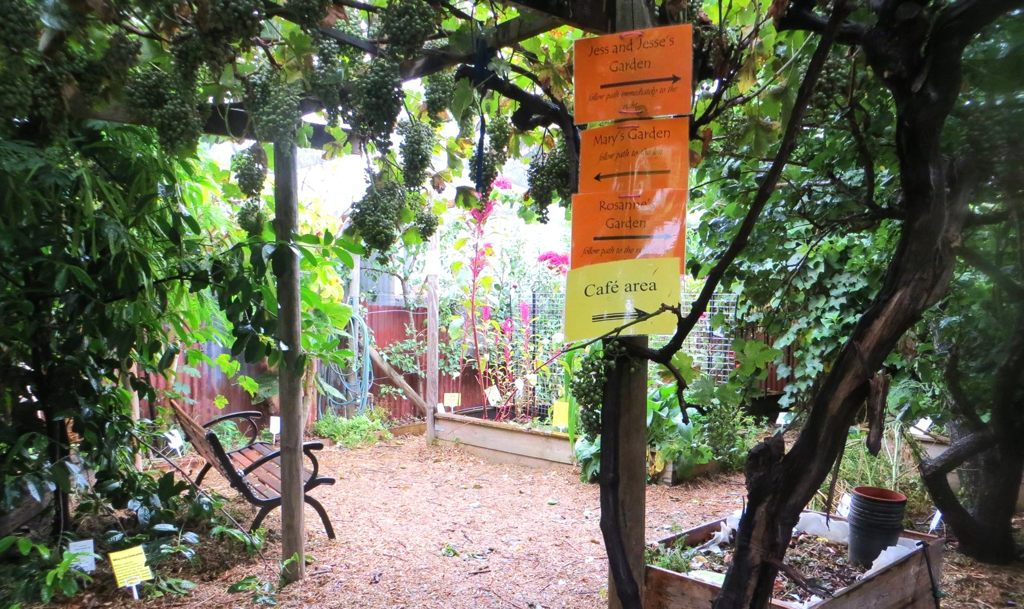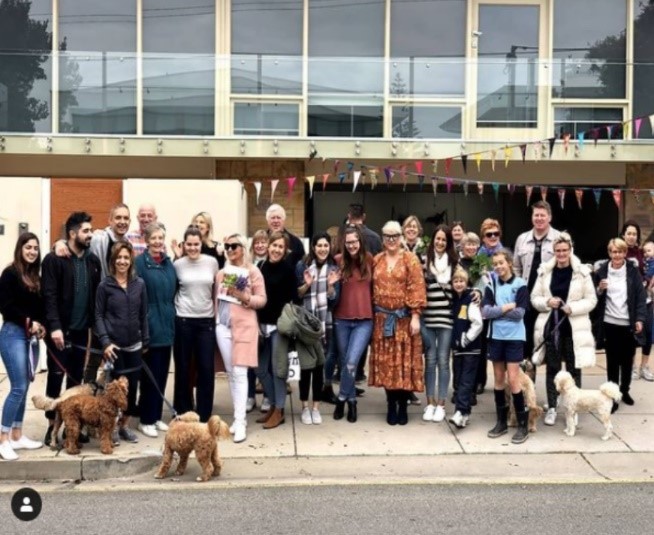Case Studies

JOE’S CONNECTED GARDEN
Beginning in the backyard of two neighbours in Elizabeth over ten years ago, Joe’s Connected Garden is an example of how neighbours can break down barriers (quite literally in the form of fences) to work together. Neighbours Rosanne and Joe decided to open the space between their fences and create one connected garden that they could maintain together. Not to keep things to themselves, Joe made the offer to his other neighbours along their street who either shared a passion for gardening or saw the benefits in working together. Now linking over 5 neighbours backyards and supported by other green thumbs across the community, with the offer of free produce with their Grow Free cart, Joe's Connected Garden has received national recognition for the way they have brought people in their local neighbourhood together. This initiative has grown to even include a successful yearly Open Garden event with guest speakers, fundraising, and plant sales.
Joe’s Connected Garden: https://www.facebook.com/JoesConnectedGarden

OPEN GARAGE
When Laura found out her neighbour Bob’s wife had passed away and that she had been unwell for some time, Laura was devastated that she had not known. Despite being a self-identified introvert she knew that something had to change. Laura suggested the idea of hosting their neighbours for a morning tea in their garage to their husband and then Open Garage was born.
Open Garage is a simple concept that involves one neighbour opening their garage door for a few hours every two months to neighbours, inviting them to share in a baked good or cup of coffee. Soon Laura found kindred spirits in B3 Coffee, a small coffee van who shared Laura’s community values. With coffee available for purchase at a low-cost price and a shared table for people to bring baked goods and garden swaps, Open Garage became a place for people to bring friends, neighbours and family together.
What makes Open Garage so special is the way it naturally evolved within the neighbourhood. From initially inviting family along to boost numbers and letter dropping flyers it grew to a website, Instagram page and over 200 regular members of the garage “bubble”. Open Garage brings people in the Brighton neighbourhood together unlike any time before.
Open Garage: https://www.opengarage.com.au/
THE PEAR NEIGHBOURHOOD NODE
When Alberton locals Christie and Joost discovered that it was 6 weeks before they knew their neighbour Tony had passed away in hospital, they were horrified at how long it took for them to find out. Calling a community forum together they listened to the needs of their neighbours and their desire to get coffee close by. Converting half of their 100-year-old town house on the corner into a coffee house The Pear was born. With Manager Annemijn at the helm the Pear is more than just a café, it is a meeting place where regular free neighbourhood driven events, conversations, workshops, get-togethers, activities, services and programs come together.
The Pear stands as a strong and important example of the role that social business enterprises can play in bringing a community together, while also demonstrating the role that government and other stakeholder agencies play in helping to sustain and support such neighbourhood initiatives. As a recipient of the Fund My Neighbourhood grant with financial backing from ECH Group and the Port Adelaide Football Club, as well as grants from the City of Port Adelaide Enfield, the Pear is able to offer so much more to its neighbours without the financial concerns that often cripple small businesses and prevent them from thinking beyond the barriers of financial overheads and costs.
The Pear Neighbourhood Node: https://thepear.com.au/what-we-do-at-the-pear/
BUY NOTHING PROJECT
The Buy Nothing Project originally began with two friends who were working hard to address three infamous “R’s”: reducing, reusing and recycling by creating an experimental hyper-local gift economy in Bainbridge Island, WA in 2013. Since then, the Buy Nothing Project has become a worldwide social movement with groups across 44 nations. Found online using the free platform provided by Facebook Groups and open-source documents, everyday people can set up their own Buy Nothing Project groups for their own neighbourhoods that allows neighbours to easily participate. Rules for Buy Nothing are simple: “Post anything you’d like to give away, lend or share amongst neighbours. Ask for anything you’d like to receive for free or borrow. Keep it legal. No hate speech. No buying or selling, no trades or bartering, we’re strictly a gift economy.” The ethos behind Buy Nothing operates around notions of a “gift economy”, whose real wealth is seen through encouraging a level of asking followed by acts of giving, the connections that are formed, and trust that is fostered between neighbours.
Buy Nothing Project: https://buynothingproject.org/
FRIENDS OF PINE GULLY
When Syrian migrant Kinda moved to Seacliff she noticed the poor conditions of a local gully near where she lived and wanted to do something about it. Developing confidence and the know how she needed to get a group started through the Smart Living Course hosted by the Holdfast Bay Council, the Friends of Pine Gully group was formed. Now operating in its fifth year, the group is largely made of neighbours who live near the gully and consider themselves a community of friends who support one another. Aside from the regular working bees the Friends of Pine Gully group have monthly morning teas and social catch-ups with each other.
With the support of their local council for insurance coverage, the Friends of Pine Gully group is a strong example of how one bright spark built their confidence to create something that brought a group of people in a local neighbourhood together. This initiative also provided the catalyst for other meaningful relationships and projects between members to grow and develop. As part of her master’s research project, Kinda undertook a deeper exploration into her own Friends of Pine Gully group and found out more about how it has instilled a sense of pride, belonging, ownership and confidence in all its members within the community.
Friends of Pine Gully: https://www.facebook.com/FriendsofPineGully

The Little Library on Lloyd
While some neighbourhood initiatives require greater foresight, effort and resources, it can often be small gestures or conversation starters that help to bring neighbours together. By placing a library box outside of one’s house, neighbours are instantly given a reason to start up a conversation with their neighbour or to actively take part in its growth. What makes the Little Library on Lloyd Street so special is not only its presence in the community, but also the added plant stall pop ups, the facilitation of local events, as well as the relationships that come about as a result. Jody takes pride in actively promoting the Little Library on Facebook, providing resources and tote bags for people to borrow and return books, and sharing in news about other initiatives in the community. Inspired by the City of Marion’s Leadership Course in 2019, Jody was encouraged to focus on a smaller achievable project in her local neighbourhood. How the Little Library was created, how it has grown, and how it has brought people in the neighbourhood together make it one of our favourite examples of a small yet tangible way that one neighbour can make a difference.
Little Library on Lloyd Street: https://littlelibraryonlloydstreet.wordpress.com/
THE RED SHED
Since opening eight years ago, The Red Shed in the Adelaide Hills community of Uraidla has become an important source of connection, support and community. A program of the Adelaide Hills Council, The Red Shed is a place open to everyone who lives in the wider neighbourhood and does not discriminate based on age, gender or ability. While a small shed in size, The Red Shed prides itself on the work that it can provide to general members of the community. For the cost of a small donation to the Shed, members will happily fix a broken chair, table, planter box etc., for anyone that comes through its doors.
What makes the Red Shed extra special is the way that the different members know and look out for each other by either giving each other lifts to the Shed, giving support to learn new things and ensuring that the site remains a space of welcome for anyone that would like to become a part. For Donna who has struggled with depression for many years, every week she “looks forward to Thursdays at the Shed”. For Terry who lost his wife many years ago and found himself lonely and isolated at home, the Shed has now given him a source of “24 friends” and belonging. With Shed coordinator Robert at the helm, The Red Shed is a place where giving ownership to the members and recognising the strength of their connection to community is integral to its way of working.
IAN STREET, MORPHETT VALE
Ian Street is a seemingly innocuous, everyday street in the suburbs of Morphett Vale. There is no Facebook, Instagram page or formal association that brings people together. Rather it is through the everyday ways that neighbourhood champions look out for each other and inspire a sense of neighbourliness that make this place special.
As a regular walker with a friendly disposition, neighbour Chris has developed a sense of notoriety among neighbours. By being seen Chris has provided greater opportunities for other neighbours to be introduced and for a sense of trust to be built. Ann has lived in the neighbourhood for close to 50 years and having been awarded the Order of Australia (OAM) for her work as a mental health advocate, she has also created a level of notoriety among her neighbourhood as being a safe space for people to seek help and support if they need it. Chris and Ann both carry with them the values and ethos that everyone on the street “has a story to tell” and is deserving of support and friendship. They encourage produce to be swapped among neighbours, organise annual celebrations, and know the names of everyone who lives in the area. Neighbours know that they can turn to Ann and Chris if they are in need, if they need a lift, or if they are just looking for a friendly ear. It is through the act of being good neighbours to each other that makes Ian Street a safer, more welcoming and inclusive place.
‘GREENING GROUPS’, CITY OF CHARLES STURT
Within the City of Charles Sturt, supported by Janet Willoughby, you will find many formal and informal community gardens that range from small, raised garden beds to kilometers of garden surrounding railway lines and train stations. Regardless of their size, the people within these gardening groups share a passion for improving the live-ability and beautification of their local neighbourhood. While many community gardens have structured memberships, fences and plots, the ‘greening’ groups within the City of Charles Sturt are open and freely accessible for all members of the community to take part, be involved and enjoy. Through these groups important relationships between neighbours are established, in which the street garden gives everyone a common purpose and reason to come together- either over a love of plants, a desire to improve the look of their street, or just meet new people and make a difference.